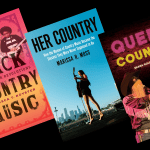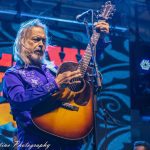Most Men Only Dream: Merle Haggard, Saban Theater, December 11, 2013
He opened strong with “Big City,” its first line – “I’m tired of this dirty old city” – met with raucous applause from the mixed audience of black-clad Angeleno industry and tour tee-shirt sporting diehards. Right into “Twinkle Twinkle Lucky Star,” a song so easy to take for granted until it’s right there in front of you in all its endearing simple warmth.
Haggard, a phenomenal guitar player, is noticeably older and a bit feeble (having had part of his lung surgically removed a few years ago after being diagnosed with lung cancer) choosing to lay off a good bulk of the lead guitar work, instead doubling his son’s faithful leads. Although Hag shined on a few solos during the evening, most notably the anthemic jam “I Think I’ll Just Stay Here and Drink,” which brought the crowd up and out into the aisles as well as a tasty jazz-tinged solo on the exquisite “Silver Wings,” the third song of the set. Despite this obvious wear, Haggard was in fine form this night. He was animated and jovial, funny, engaging. His vocals were perfect, soulful, loaded with pathos and proficiency. His touring band, The Strangers, a well-seasoned, well-oiled machine in the great tradition of the classic bands like Ernest Tubb’s Texas Troubadours or Bob Wills’ Texas Playboys. The catalog speaks for itself, up there with Dylan or Gershwin for its proliferation and significance.
Haggard is a giant. His artistry is big, the themes of his work broad: love and loss, crime and punishment, survival and the American experience. His art not only examines this existentialism – it has become existential itself. I look at the well-dressed woman next to me out of the corner of my eye. Well into the fourth or fifth song and she hasn’t put her phone away for a single second since arriving late. She doesn’t applaud once during the show, doesn’t participate in any of the many standing ovations, doesn’t seem to even notice the performance. She seems entirely void of any joy being in the presence of a master artist demonstrating a dying craft, an ageing ambassador from an ending era sharing his experience with us fortunate few in an intimate setting.
As he pointed out more than once last night, Merle Haggard is a son of California. He is a Westerner and that ethos permeates his work and approach; open skies and possibilities, no fences, no rules.
“Silver Wings” lead directly into the fabled “Mama Tried,” a brutal one-two punch of heartbreak and regret. Here is not merely a man on stage singing a song but, rather, the personification of an American mythology. “Mama Tried” is as much the embodiment of country music as anything. Haggard, a notoriously deep thinker and historian, is very much aware of his place in the story of country music; of his importance and influence and the direct line from Jimmie Rodgers to Ernest Tubb to Lefty Frizzell to Haggard himself, and from there to everything beyond, for better or worse. With the relatively recent death of George Jones, and as Ray Price heads home from the hospital to ride out the final days of his fight with pancreatic cancer in hospice care from the comfort of his Texas ranch, Haggard is acutely aware of his roll (along with Willie Nelson) as the last of a breed of a certain kind of troubadour. This weight that he carries is a noticeable albatross on the already diminutive-in-stature artist, but it is worn with an unyielding sense of duty.
Down every road there’s always one more city
Like many artists of his generation, Haggard fell into a widening gyre of cocaine and apathy in the 1980’s only to reemerge in the 1990’s with a newfound artistic integrity and purpose; refreshed, inspired. “If I Could Only Fly,” the title track to his 2000 Anti masterpiece, has become a latter-day staple. Haggard goes somewhere when he performs this song; somewhere inside of it, inside of the tortured disconnect found in an uncaring world, a lost – or at least distant – love, the deceptive optimism in the title a mere tease followed by bleak reality. When Haggard sings this song live it is as if time stops. Surely the band is playing, but they are not heard. They fade back into the curtain, into the stage. The audience becomes blurred, out of focus. The spotlight, somehow brighter, seems to lift the singer above us, above the moment. There is nothing in the world for those few minutes but this one man and this one song. It cuts deep.
But I can hardly stand
And I’ve got no where to run
Another sinking sun
And one more lonely night
“If I Could Only Fly” was the turning point into the second half of the set which snowballed, one great performance after another, into inevitable climax.
Fiddler and front man Scott Joss took the Willie vocal part on “Pancho and Lefty,” Townes Van Zandt’s philosophical tale of brotherhood and betrayal. Then “Workin’ Man Blues” and “Footlights,” one of the gems of his self-destructive period. He performs what was once almost a cry for help now with wry humor, fully aware that those wild, dissatisfied days are behind him.
I live the kind of life that most men only dream of
I make my livin’ writin’ songs and singin’ them
But I’m forty-one years old and I ain’t got no place to go when it’s over
So I lie about my age and make the stage and
Try to kick the footlights out again
Haggard always includes a song or two where he plays the fiddle; an instrument he learned in preparation for his 1970 tribute album to Bob Wills, one of his musical heroes. Haggard’s fiddle playing is top notch and he and Joss trade off runs and play in the twin fiddle style of Wills’ western swing band superbly. Haggard is animated like a school boy as he conducts the band, assigning solos with the bow, signaling for more intensity from his soloists, imitating master bandleader Wills with an eerie accuracy. (Haggard is famous for his spot-on comedic imitations of country music stars, right down to the mannerisms and facial ticks.)
“Sing Me Back Home,” Haggard’s semi-autobiographical prison song about the transformative power of music, may be his greatest. It was certainly the highlight of this show. The opening line, “the warden led a prisoner down the hallway to his doom, and I stood up to say goodbye like all the rest,” sounds phony in the hands of most singers, but it is so easy to picture the scene, to picture a young Merle Haggard in a San Quentin cell block, on the threshold of discovering that music will be his way out, his literal salvation.
He looks at the band, “let’s do it in G.”
It is as sentimental as a prison song can be, dripping with nostalgia and an almost quaint innocence that buoys the otherwise unbearable heaviness of the song.
I recall last Sunday morning a choir from off the street
Came in to sing a few old gospel songs
And I heard him tell the singers ‘There’s a song my mama sang.
Could I hear it once before you move along?’
Sing me back home, with a song I used to hear
Make my old memories come alive
Take me away and turn back the years
Sing me back home before I die
I think of the woman next to me, thinking surely this has got to sink in even on some surface level. I’m rooting for her. I want her to be moved, to share this experience. The power of this song, this performance, this man, this milieu is too strong not to affect anyone in its wake. I glance over at her and she is rustling around in her purse, looking for something inside. If Merle Haggard singing this song, completely on top of his game, could do nothing for her then I suppose there would be little hope in the transcendental affect of a choir from off the street. The song, having heard it thousands of times, still leaves me in quiet awe.
The final song of the night was the obligatory “Okie From Muskogee.” As much a cultural phenomenon as a hit record, it is easily Haggard’s best known work. I’ve never liked the song. It always seemed to me like an ill-conceived inside joke that left me cold. But I also understand that whenever a song generates a reaction in the listener on the level that “Okie” does, there must be something there. The performance this night forever changed my opinion of the song, and I see it now as the clear classic that it is. Oddly enough the song has aged well, rather than the other way around as would be expected. Haggard has somehow managed to tap into an elasticity with the song. Always a bit tongue in cheek, but never full satire, it works on its surface level and has become somehow bigger than itself. The squares can dig it for its earnestness, the groovers can dig it for its aplomb.
After a weird and amusing introduction about Robert Mitchum and marijuana, he began the song and the house erupted. People crammed the aisle, shouting along with every lyric, expressing their unrestrained jubilation about respecting the college dean and a distaste for beads and Roman sandals. It wasn’t the story of the song that moved me, it was the song itself, the vastness of it, the joy it ignited.
The woman next to me has finally come alive. Even she can not resist the “Okie From Muskogee” phenomenon. She taps her foot, she’s digging it. We dig it together, from different perspectives but arriving at the same place.
The last of the giants then left the stage. There was no encore, but there will be another show. Back on the bus, down every road, Merle Haggard will take the stage again and transform another audience. And he will do it every night until he stops. And on that day, a significant piece of Americana will end with him.




